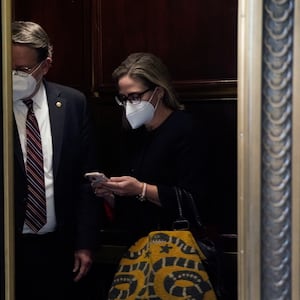When news broke on Wednesday that Supreme Court Justice Steven Breyer, 83, was retiring, it was predictable that scarred Democrats immediately started stressing about the two senators who’ve so far exercised veto power over their party’s agenda.
In the evenly split Senate, Sens. Joe Manchin (D-WV) and Kyrsten Sinema (D-AZ) have stymied Democrats’ marquee climate and social spending bill and scuttled the party’s promises on voting rights by refusing to support changes to Senate rules.
With President Joe Biden set to make one of his most momentous moves yet—the appointment of a Supreme Court justice—the centrist duo could again play the spoiler role on an enormous stage.
But they probably won’t.
There are a few reasons Democrats believe that the incentives for Manchin and Sinema to complicate Biden’s first high court pick are minimal, bordering on nonexistent.
To begin with, explained one Senate Democratic aide, the stakes of this fight are far less fraught, because Democrats are moving to replace a liberal justice with a liberal justice.
If a conservative were being replaced by Biden, perhaps Manchin or Sinema would feel heightened pressure to block or delay a high court pick, said the aide, but success for Democrats in this battle will result in the 6-3 conservative majority on the court remaining the same.
What’s more, that majority likely will have been enough to secure a number of long-awaited outcomes on the right—primarily a rollback of abortion rights, which the court could decide before Biden’s nominee gets a hearing. With that kind of potential victory behind Republicans, the aide predicted a “low-energy” opposition to Breyer’s replacement within the Senate GOP.
In a statement released Wednesday afternoon, Manchin offered few clues. “I take my Constitutional responsibility to advise and consent on a nominee to the Supreme Court very seriously,” he said. “I look forward to meeting with and evaluating the qualifications of President Biden’s nominee to fill this Supreme Court vacancy.”
Sinema has yet to release a statement. Her office declined to comment on the retirement reports.
At the top of Biden’s shortlist is Ketanji Brown Jackson, whom he placed on the D.C. circuit court of appeals last year to replace Attorney General Merrick Garland. Other reported top picks are Leondra Kruger, a California Supreme Court judge; J. Michelle Childs, a district court judge in South Carolina; and Leslie Abrams Gardner, a Georgia district court judge.
There are several Republican senators who have voted for liberal nominees before, such as Sens. Susan Collins (R-ME) and Lisa Murkowski (R-AK). If one or more of them supports Biden’s pick, the power of Manchin or Sinema wouldn’t just drastically diminish; they may have more reason to back the nominee.
But Manchin and Sinema have put up zero opposition to the president’s selections for other spots on the federal bench. Both have voted for each one of his 42 nominees to federal district and appeals courts—including Brown Jackson, who was confirmed for her current position last summer. And they both have voted for several nominees who faced unanimous, and sometimes stiff, Republican opposition, such as Jennifer Sung.
Sung, who was nominated to the Ninth Circuit Court of Appeals last year, was castigated by GOP senators for a letter she wrote opposing the confirmation of Brett Kavanaugh, in which she called him an “intellectually and morally bankrupt ideologue.” In her Senate Judiciary Committee hearing, she didn’t disavow that statement, and no GOP senators voted to confirm her. Sinema and Manchin did, and Sung was sent to the Ninth Circuit on a 50-49 vote.
But Democrats can’t take it for granted that their fractious 50-member majority will row in the same direction through every step of the confirmation process, some say, and there are plenty of ways that they could complicate party leaders’ plans for an ultra-swift confirmation process.
Manchin “won’t reflexively be a yes,” said a source close to the senator. Still, they added they would be “stunned” if he voted no on anyone on Biden’s shortlist. And the West Virginia senator could be inclined to slow down the brisk process top Democrats seem to have in mind, if the senator feels he doesn’t have time to consider the nominee, that source said.
When Republicans tried to muscle Amy Coney Barrett through the Senate in October 2020, Manchin voted no after vocally raising his concerns about the GOP’s month-long confirmation timeline. In his statement announcing the vote—his only one against a Trump high court pick—Manchin repeatedly referred to the “rushed” process.
Sinema, meanwhile, voted against both Kavanaugh and Barrett. While her opposition to changing the Senate’s 60-vote threshold has exasperated Democrats, one of her justifications has been preserving the right to an abortion. Some Democrats believe it unlikely that she would make an issue out of Biden’s efforts to quickly shore up the pro-choice minority on the court.
There is also the issue of Sinema’s tanking reputation among Arizona Democrats, which is fueling a nascent effort to primary her in 2024. Chris Herstam, a former Arizona state lawmaker and onetime ally of Sinema’s, said he expects Sinema to support Biden’s nominee.
“It provides her an opportunity to attempt to get back in the good graces with Democratic progressives—as futile as that may be,” Herstam said, though he added “nothing is certain” with the senator.
And the future nominee’s prospects for passage are made even cozier by an apparent lack of holdups from progressives, some of which had been pressuring Breyer to retire for months.
Not to mention, the promise of a history-making nominee.
From the earliest days of his presidential campaign, Biden made a very specific commitment to potential supporters: that he would nominate the first Black woman to sit on the Supreme Court.
“Number one, I committed that if I’m elected as president and have the opportunity to appoint someone to the courts, I’ll appoint the first Black woman to the court,” Biden said during a Democratic primary debate in March 2020. “It’s required that they have representation now—it’s long overdue.”
So far, the White House has maintained almost impressively mute on the question of how and when such a nomination would be rolled out. Every question reporters posed to White House press secretary Jen Psaki on Wednesday afternoon about Breyer’s retirement—no matter how oblique—was met with some version of the same non-answer.
“I’m not going to speak to the reports of a Supreme Court justice retirement that hasn’t been announced,” Psaki said at one point.
Breyer’s official announcement of his retirement isn’t expected until Thursday.
Even by the standards of a historically unleaky White House, the unwillingness of anyone close to the president or the administration to speak about potential nominees—or even the process by which a nominee might selected—was striking. No fewer than four people close to the White House responded to inquiries by directing The Daily Beast either to a tweet posted by Psaki on Wednesday morning stating that it “has always been the decision of any Supreme Court Justice if and when they decide to retire, and how they want to announce it, and that remains the case today,” or to Biden’s own spare remarks to pool reporters during an event with CEOs in the State Dining Room that afternoon.
“I’ll just say one thing about Justice Breyer: every justice has the right and the opportunity to decide what he is or she is going to do, and announce it on their own.,” Biden said. “There has been no announcement from Justice Breyer. Let him make whatever statement he’s going to make, and I’ll be happy to talk about it.”









